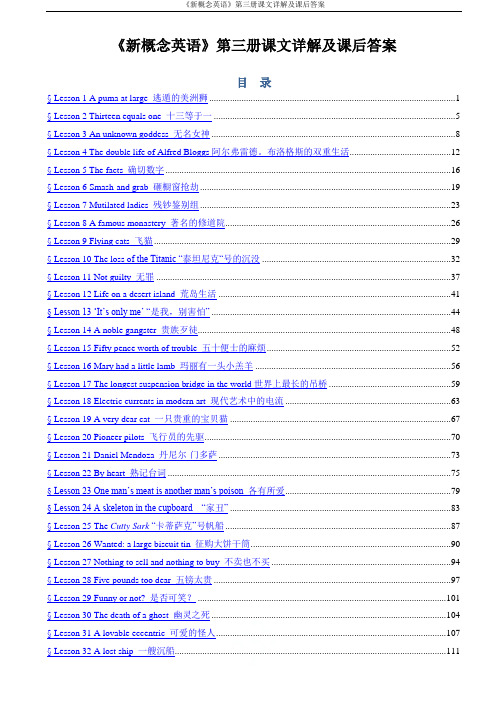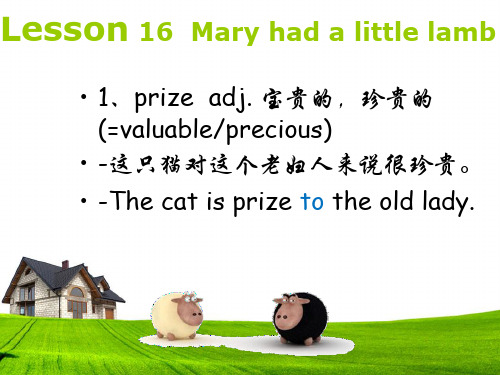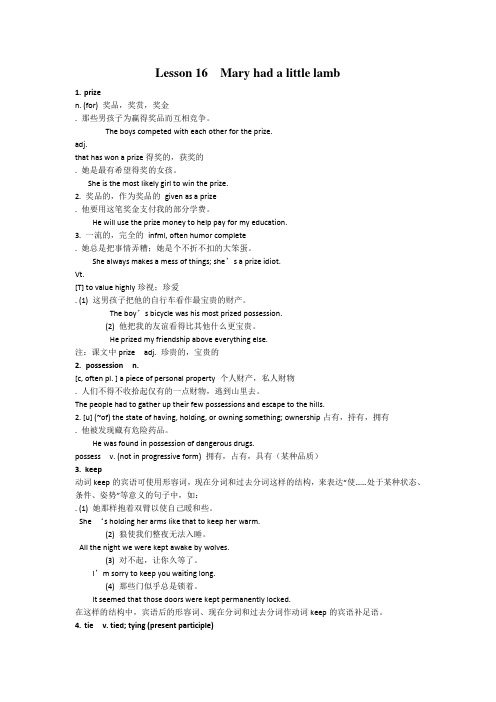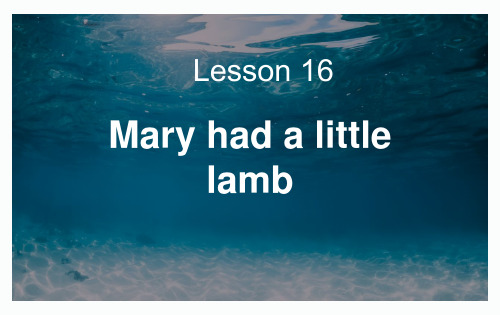新概念第三册Lesson16
《新概念英语》第三册课文详解及课后答案

《新概念英语》第三册课文详解及课后答案目录§ Lesson 1 A puma at large 逃遁的美洲狮 (1)§ Lesson 2 Thirteen equals one 十三等于一 (5)§ Lesson 3 An unknown goddess 无名女神 (8)§ Lesson 4 The double life of Alfred Bloggs阿尔弗雷德。
布洛格斯的双重生活 (12)§ Lesson 5 The facts 确切数字 (16)§ Lesson 6 Smash-and grab 砸橱窗抢劫 (19)§ Lesson 7 Mutilated ladies 残钞鉴别组 (23)§ Lesson 8 A famous monastery 著名的修道院 (26)§ Lesson 9 Flying cats 飞猫 (29)§ Lesson 10 The loss o f the Titanic “泰坦尼克“号的沉没 (32)§ Lesson 11 Not guilty 无罪 (37)§ Lesson 12 Life on a desert island 荒岛生活 (41)§ Lesson 13 ‘It’s only me’ “是我,别害怕” (44)§ Lesson 14 A noble gangster 贵族歹徒 (48)§ Lesson 15 Fifty pence worth of trouble 五十便士的麻烦 (52)§ Lesson 16 Mary had a little lamb 玛丽有一头小羔羊 (56)§ Lesson 17 The longest suspension bridge in the world世界上最长的吊桥 (59)§ Lesson 18 Electric currents in modern art 现代艺术中的电流 (63)§ Lesson 19 A very dear cat 一只贵重的宝贝猫 (67)§ Lesson 20 Pioneer pilots 飞行员的先驱 (70)§ Lesson 21 Daniel Mendoza 丹尼尔.门多萨 (73)§ Lesson 22 By heart 熟记台词 (75)§ Lesson 23 One man’s meat is another man’s poison 各有所爱 (79)§ Lesson 24 A skeleton in the cupboard “家丑” (83)§ Lesson 25 The Cutty Sark“卡蒂萨克”号帆船 (87)§ Lesson 26 Wanted: a large biscuit tin 征购大饼干筒 (90)§ Lesson 27 Nothing to sell and nothing to buy 不卖也不买 (94)§ Lesson 28 Five pounds too dear 五镑太贵 (97)§ Lesson 29 Funny or not? 是否可笑? (101)§ Lesson 30 The death of a ghost 幽灵之死 (104)§ Lesson 31 A lovable eccentric 可爱的怪人 (107)§ Lesson 32 A lost ship 一艘沉船 (111)§ Lesson 33 A day to remember 难忘的一天 (114)§ Lesson 34 A happy discovery 幸运的发现 (118)§ Lesson 35 Justice was done 伸张正义 (123)§ Lesson 36 A chance in a million 百万分之一的机遇 (126)§ Lesson 37 The Westhaven Express 开往威斯特海温的快车 (129)§ Lesson 38 The first calender 最早的日历 (132)§ Lesson 39 Nothing to worry about 不必担心 (136)§ Lesson 40 Who’s who 真假难辨 (140)§ Lesson 41 Illusions of pastoral peace 宁静田园生活的遐想 (142)§ Lesson 43 Fully insured 全保险 (149)§ Lesson 44 Speed and comfort 又快捷又舒适 (152)§ Lesson 45 The power of the press 新闻报道的威力 (160)§ Lesson 46 Do it yourself 自己动手 (164)§ Lesson 47 Too high a price? 代价太高 (169)§ Lesson 48 The silent village 沉默的村庄 (174)§ Lesson 49 The ideal servant 理想的仆人 (176)§ Lesson 50 New Year resolutions 新年的决心 (178)§ Lesson 52 Mud is mud 实事求是 (183)§Lesson 53 In the public interest 为了公众的利益 (188)§ Lesson 54 Instinct or cleverness? 是本能还是机智 (192)§ Lesson 58 A spot of bother 一点儿小麻烦 (197)§ Lesson 59 Collecting 收藏 (199)§ Lesson 60 Too early and too late 太早和太晚 (205)§ Lesson 1 A puma at large 逃遁的美洲狮【New words and expressions】生词和短语◆puma n. 美洲狮◆spot v. 看出,发现◆evidence n. 证据◆accumulate v. 积累,积聚◆oblige v. 使…感到必须◆hunt n. 追猎;寻找◆blackberry n. 黑莓◆human being 人类◆corner v. 使走投无路,使陷入困境◆trail n. 一串,一系列◆print n. 印痕◆cling (clung, clung ) v. 粘◆convince v.使…信服◆somehow adv. 不知怎么搞地,不知什么原因◆disturb v. 令人不安学习词汇时仅知道汉语语义是不够的,要把单词放在语句中体会其应用;学习关键句型结构时则要把它放在段落结构或文章里★spot v. 看出,发现pick out / see / recognize / catch sight ofeg: A tall man is easy to spot in the crowd.He has good eye for spotting mistakes. 他有敏锐的识别错误的能力。
新概念英语第三册 Lesson 16 课件

• While they were talking it began to rain and Dimitri stayed in Aleko's house until the rain stopped.
• dye v.染色 • -把头发染成黄色。 • -Dye the hair yellow. • hair dye • 染发剂 • dye house • 染坊 • n.染料
• -你们最好换上长袍。
• -you two better change into ropes. • - you two had better change into
Lesson 16 Mary had a little lamb
• 1、prize adj. 宝贵的,珍贵的 (=valuable/precious)
• -这只猫对这个老妇人来说很珍贵。 • -The cat is prize to the old lady.
• n.奖品,奖赏 • 一等奖 • the first prize • 诺贝尔奖 • the Nobel Prize • 诺贝尔医学奖 • the Nobel Prize for Medicine • 最佳摄影奖 • the prize for best photography • 最佳导演/男演员/女演员奖 • the prize for best director/actor/actress
• One evening, however, the lamb was missing. The rope had been cut, so it was obvious that the lamb had been stolen.
新概念三第16课原文

新概念三第16课原文新概念英语第三册第16课的原文如下:Lesson 16 The Sporting Spirit.Every year, in the spring, the Rugby football teams of Oxford and Cambridge meet one another in London. This is a very important event, for it is not only a great sporting occasion, but also a social event of the greatest importance. Many graduates, who have not seen one another for years, meet at this annual gathering. The game itselfis extremely rough and dangerous, but this seems to be part of its attraction. The players, most of whom are quite young, do not seem to mind this; indeed, they seem to enjoy it. They play with such enthusiasm and determination that they often receive injuries. This, however, does not worry them. On the contrary, it seems to please them. They take a pride in their injuries and are quite unconcerned about any pain they may suffer. They are proud of the scars on their faces and bodies and are quite happy to explain to you howthey came by them. It is not at all unusual to hear a player say, 'I got this scar when I broke my leg in the match against Cambridge' or 'This is the scar I got when I sprained my ankle in the match against Oxford.' They will then go on to tell you all about the incident in question. It is clear that they are extremely proud of their injuries and regard them as medals. They seem to think that the more scars they have, the better players they are. This is, of course, absurd, but it shows the great spirit of the game.以上就是新概念英语第三册第16课的原文。
新概念英语第三册lesson 16语言点

L16课堂笔记1.prize [praɪz]adj. 心爱的,受珍视的prize / prized adj. 心爱的One of Mary's prize possessions was a little white lamb which her husband had given her. valued / treasured / cherished adj.心爱的prize / value / treasure / cherish vt. 珍爱,珍视I’ll ~ our friendship for ever.This is a lesson you’re going to ~.valuable / priceless / preciousadj. 宝贵的,价值连城的precious stoneIt was very old and precious even then.2.tie [taɪ]v. 拴,系tie … to …Tie the horse to a tree.绑:The thief was tied / bound(bind) / chained(chain) to a tree.3.theft n. 盗窃 (thief n. 贼)He is guilty of theft. (be guilty of犯…罪)burglary n. 入户行窃steal sth. from sb.偷某人某物rob sb. of sth.抢劫某人某物help oneself to sth.(1)请自便(2)偷,抢One of the thieves was struck by a heavy statue, but he was too busy helping himself to diamonds to notice any pain.poach v.盗捕Deer have been poached here for years.4.accuse [ə'kju:z]v. 指控;(愤怒地)指责accuse sb. of sth.指责某人做某事(带有愤怒的情绪)I accused him of stealing my sheep.criticize sb. for sth.因某事而批评某人(正式)He was criticized for his delay in dealing with the matter.censure sb. for sth.因某事而严肃批评某人Ministers were censured for their lack of decisiveness during the crisis.scold sb. for sth.因某事而指责某人His mother scolded him for breaking her favorite vase.blame sb. for sth.=blame sth. on sb.把某事归咎于某人(强调责任)They blamed George for the failure.They blamed the failure on George.reprimand sb. for sth.因某事而批评某人(上级→下级)I was reprimanded by my manager for being late.condemn A for / as B因为B谴责A/把A谴责为BThe movie was condemned for its sexism.The terrorist attack was condemned as an act of barbarism and cowardice.5. deny [dɪ'naɪ]v. 否认deny + sth. / doing / that …He denied the charge. / knowing about it. / that he had stolen the sheep.admit / acknowledge + sth. / doing / that …承认…He admitted / acknowledged the charge. / knowing about it. / that he had stolen the sheep.6. ashamed [ə'ʃeɪmd]adj. 惭愧的,羞耻的be ashamed of …对…羞耻的/惭愧的You should be ashamed of your behavior.be ashamed to do耻于去做某事Their behavior makes me ashamed to be Chinese!shame v.使丢脸disgrace v.使耻辱,使蒙羞humiliate v.使耻辱,使蒙羞bring shame / disgrace on …使耻辱,使蒙羞His behavior shamed / disgraced / humiliated / brought shame on / brought disgrace on his family.他的行为使他的家庭蒙羞shame n. 羞耻;可惜Shame on you!真丢人!What a shame!真可惜!put sb. / sth. to shame使……相形见绌They have all been put to shame by a boy who, while playing truant, travelled 1,600 miles.7. apologize[ə'pɒlədʒaɪz]v. 道歉apologize to sb. for sth.因某事而向某人道歉I apologized to him for being late.make an apology to sb. for sth.对某事充满歉意=say sorry to sb. for sth.=be apologetic about sth.He was apologetic about his late arrival.1. southern … = the south of …northern … = the north of …eastern … = the east of …western … = the west of …她来自中国西部。
新概念三 Lesson 16 Mary Had a Little Lamb - 详细知识点

※词汇详解※1. Prize n./adj⑴n. 奖品,奖金,奖励①booby prize : 安慰奖②win a prize : 赢得大奖eg: the first prize goes to peter.一等奖获得者是peter.Eg: carry off the first prize. 夺得一等奖⑵Adj : prize money : 奖金①A prize idiot: a complete fool②A prize fool⑶The best, the most important or most useful.最宝贵的;最珍贵的Prize possessions 最珍贵的财产(令人骄傲的)⑷Precious: which was important to you because you are connected with people you like.①Precious historical relics: 珍贵的历史遗迹②Precious possessions : 珍贵的财产③Rare animals : 珍惜的动物⑸valuable adj. 值钱的A valuable paintingValuable time: 宝贵的时间⑹prize n./adj 珍视,珍惜v.prize the friendship : 珍视友情2. possession [pə'zeʃ.ən] noununcountable 拥有,占有;具有•The possession of large amounts of money does not ensure happiness.拥有大量金钱并不能保证一定会幸福。
•I have in my possession a letter which may be of interest to you.我有一封信,也许你会感兴趣。
•He was found in possession of explosives.他被发现私藏爆炸物。
新概念三lesson 16 Mary had a little lamb课文讲解及语法点

lesson 16 Mary had a little lambListen to the tape then answer the question below.Was Dimitri right to apologize to his neighbour? Why not?Mary and her husband Dimitri lived in the tiny village of Perachora (in the big city of Beijing/in the beautiful city of Paris) in southern Greece. One of Mary's prize possessions(所有物possess vt.拥有) was a little white lamb which her husband had given her. She kept it tied to a tree in a field during the day and went to fetch it every evening. One evening, however, the lamb was missing. The rope had been cut, so it was obvious that the lamb had been stolen.When Dimitri came in from the fields, his wife told him what had happened. Dimitri at once set out to find the thief(set out to do sth 开始着手做某事).He knew it would not prove difficult(=it would not be difficult: prove是连系动词,作“证明是”讲) in such a small village. After telling several of his friends about the theft(tell sb.about sth.), Dimitri found out that his neighbour, Aleko, had suddenly acquired a new lamb.Dimitri immediately went to Aleko's house and angrily accused him of stealing the lamb. He told him he had better( had better (not)do>should/ought to:建议,语气更强烈,常带威胁、告诫或催促的意思。
新概念英语第三册第16课

Lesson 16 Mary had a little lamb1.prizen. (for) 奖品,奖赏,奖金. 那些男孩子为赢得奖品而互相竞争。
The boys competed with each other for the prize.adj.that has won a prize得奖的,获奖的. 她是最有希望得奖的女孩。
She is the most likely girl to win the prize.2. 奖品的,作为奖品的given as a prize. 他要用这笔奖金支付我的部分学费。
He will use the prize money to help pay for my education.3. 一流的,完全的infml, often humor complete. 她总是把事情弄糟;她是个不折不扣的大笨蛋。
She always makes a mess of things; she’s a prize idiot.Vt.[T] to value highly珍视;珍爱. (1) 这男孩子把他的自行车看作最宝贵的财产。
The boy’s bicycle was his most prized possession.(2) 他把我的友谊看得比其他什么更宝贵。
He prized my friendship above everything else.注:课文中prize adj. 珍贵的,宝贵的2.possession n.[c, often pl. ] a piece of personal property 个人财产,私人财物. 人们不得不收拾起仅有的一点财物,逃到山里去。
The people had to gather up their few possessions and escape to the hills.2. [u] (~of) the state of having, holding, or owning something; ownership占有,持有,拥有. 他被发现藏有危险药品。
新概念英语第三册PPT课件:NCE3_lesson16(共25页)

• set sb. off doing sth.使某人笑、哭或说起来
Was Dimitri right to apologize t o his neighbor?
Why not?
Every evening, Mary used to go and ______
n. relationship; necktie 关系;领带, 领结 eg. the ties of friendship 朋友关系 family ties 家族关系 ties of blood 血缘关系
平局 The match ended in a tie.
theft
• n. stealing 盗窃行为;盗窃案;盗窃(罪);被盗 • eg. 他因为偷窃被关进监狱。 • He was put in prison for theft/stealing. •
C Dimitri had a lot of friends in the village
D the rain would soon wash the black dye off the lamb
When Aleko first showed Dimitri the lamb in his backyard ______ .
Tell us what happened after Dimitri came in from the fields 1 Dimitri----in from fields----wife told him what had
• set out to leave a place and begin a journey/to begin a job
- 1、下载文档前请自行甄别文档内容的完整性,平台不提供额外的编辑、内容补充、找答案等附加服务。
- 2、"仅部分预览"的文档,不可在线预览部分如存在完整性等问题,可反馈申请退款(可完整预览的文档不适用该条件!)。
- 3、如文档侵犯您的权益,请联系客服反馈,我们会尽快为您处理(人工客服工作时间:9:00-18:30)。
• • • • • • • • • • • • • • • • •
5. fetch vt. 1. 拿来 e.g. (1) 我不想让你去给我拿任何东西。 I don’t want you to fetch anything for me. (2) 我又去拿了一个杯子。 I went and fetched another glass. 注:fetch是去某处去拿某物,而bring是将某物带到你所在的地方。试比较: (1) 如果你去厨房,请顺便给我带杯水过来,行吗? If you are going to the kitchen, would you mind bringing me a glass of water please? (2) 请给我倒杯水。 Please fetch me a glass of water. 而 take 则是将某物从此处拿到另一处 e.g. 把这杯水拿给你父亲。 Take this glass of water to your father. 2. 请来,接 e.g. 每天下午他都在她回家的路上接她。 Every afternoon he fetches her on her way home.
• 3. keep • 动词keep的宾语可使用形容词,现在分词和过去分词这样的结构, 来表达“使……处于某种状态、条件、姿势”等意义的句子中, 如: • e.g. (1) 她那样抱着双臂以使自己暖和些。 • She ‘s holding her arms like that to keep her warm. • (2) 狼使我们整夜无法入睡。 • All the night we were kept awake by wolves. • (3) 对不起,让你久等了。 • I’m sorry to keep you waiting long. • (4) 那些门似乎总是锁着。 • It seemed that those doors were kept permanently locked. • 在这样的结构中,宾语后的形容词、现在词和过去分词作动词 keep的宾语补足语。
• 7. missing and lost • 注:这两个动词都可以表示“丢失”,“失去”的意思。 lose 语气较强, 一般指失去不易找回。miss 有“发现失去”的意思,指东西找不到,但 有找到的希望。 • e.g. (1) 那个人在战争中失去了一条腿。 • The man lost a leg in the war. • (2) 她在街上把孩子丢了。 • She missed her child in the street. • 在很多情况下两者可互相替换。 • e.g. (1) I have lost my umbrella. 我把伞丢了。 • (2) On my way home, I missed my umbrella.回家路上,我发觉我的伞不 见了。 • 作定语时,lose 用过去分词形式,miss 用现在分词形式。例如: • e.g. 他们立即出发去寻找丢失的女孩。 • They set out to look for the missing girl at once. • miss 可以表示“想念”的意思,lose则不能。 • e.g. 你不在时我们都会想念你的。 • We shall all miss you when you go away.
Listening comprehension
Choose the correct answers to the questions on page 76.
• • • • • • • • • • • • • • • •
1. prize n. (for) 奖品,奖赏,奖金 e.g. 那些男孩子为赢得奖品而互相争。 The boys competed with each other for the prize. adj. 1. 奖品的,作为奖品的 given as a prize e.g. 他要用这笔奖金支付我的部分学费。 He will use the prize money to help pay for my education. 2. 一流的,完全的 infml, often humor complete e.g. 她总是把事情弄糟;她是个不折不扣的大笨蛋。 She always makes a mess of things; she’s a prize idiot. Vt. [T] to value highly珍视;珍爱 e.g. (1) 这男孩子把他的自行车看作最宝贵的财产。 The boy’s bicycle was his most prized possession. (2) 他把我的友谊看得比其他什么更宝贵。 He prized my friendship above everything else. 注:课文中prize adj. 珍贵的,宝贵的
• • • • • • • • •
9. set out 1. to leave a place and begin a journey出发;动身;启程 e.g. 他们动身踏上最后一段行程。 They set out on the last stage of their journey. 2. to begin a job, task, etc. with a particular aim or goal (怀着目标) 开 始工作,展开任务 e.g. (1) 她一心努力要打破世界纪录。 She set out to break the world record. (2) 他们实现了既定的目标。 They succeeded in what they set out to do.
1. 2. 3. 4. 5. 6. 7. 8.
What did Mary tell Dimitri when he came home? What did Dimitri learn about his neighbor, Aleko? Where did Dimitri go? What did he accuse Aleko of? Did Aleko show Dimitri his new lamb or not? What color was it? What did Dimitri do when he saw it was black? Why did Dimitri stay in Aleko’s house for half an hour? 9. Why did he get a surprise when he went outside? 10. Had the lamb been dyed or not?
• 6. missing • adj. that cannot be found; not in the proper or expected place; lost找 不到的,丢失的 • e.g. 这个报告遗漏了一些重要的数字。 • Some important figures are missing from this report. • lost adj. 1. that cannot be found by the owner遗失的,丢失的 • e.g. 走失的狗 a lost dog • 2. unable to find the way迷路的 • e.g. 我在雪中迷了路。 • I got lost in the snow. • 3. no longer possessed or existing失去的,不复存在的 • e.g. (1) 逝去的青春 one’s lost youth • (2) 失传的艺术 a lost art • 4. not used, obtained, or won 错过的;未好好利用的;没能赢得的 • e.g. 错过的机遇 a lost opportunity
• 8.obvious • adj. (to) easy to see and understand; clear; which must be recognized明显的,明白的,显 著的,显而易见的 • e.g.每个人都明白他在撒谎。 • It was obvious to everyone that he was lying. • adv. obviously明显地,显著地,显而易见地
• • • • • • • • • • • • • • •
4. tie v. tied; tying (participle present ) 1. [T] to fasten with a cord, rope, etc[用绳、带等] 系、拴、扎、捆 e.g. (1) 把这标签系到你的手提箱上。 Tie this label onto your suitcase. (2) 她把马拴在一棵树上。 She tied her horse to a tree. tie……to…… 把……拴/系在…… 2. [T] to fasten by drawing together and knotting把[带子等] 打结,系上 e.g. 你学会系自己的鞋带了吗? Could you tie your own shoe laces yet? n. 1. also 又作necktie esp. AmE 领带,领结 2. a cord, string, etc. used for fastening sth.(捆扎东西的)绳子,带子 3.[usua. pl.] something that unites; bond联系,关系 e.g. (1) 亲属关系 family ties (2) 友好关系 ties of friendship
• 10. it would not prove difficult 是不难 做到的 • prove 是连系动词,作“证明是”讲, 本句子与it would not be difficult相同
• 11. theft • n. [c; u] (an example of) the crime of taking someone else’s property from a place; stealing偷窃,盗窃;窃案 • e.g. 这座大楼保了火险和失窃险。 • The building has been insured against fire and theft. • thief n. (pl. thieves) a person who steals, esp. without using violence (尤指不使用暴力的) 小偷,(窃)贼
